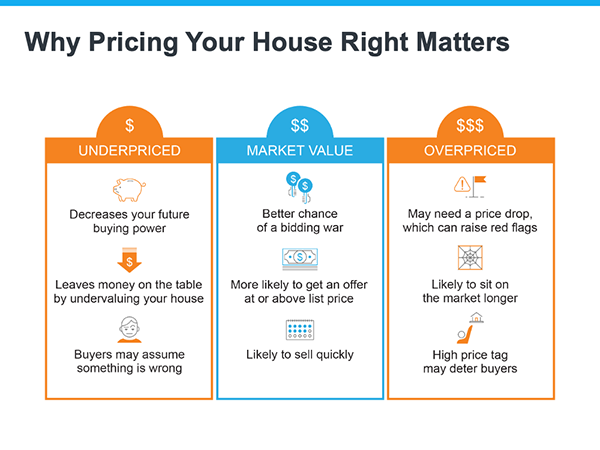How Pricing a House Too High or Low Can Hurt You When You Sell
In today’s competitive housing market, it’s easy to think you can put any price tag on your home and it will sell. Yes, multiple offers are still a thing. Yes, it is still a sellers’ market. But maximizing your profits requires pricing your home correctly. Wondering, How much is my house worth? Don’t leave it up to gut feelings or guesses. Make sure you get an answer from a real estate expert.
Why Does Pricing Your House Correctly Matter?
For many people, selling a home is one of the biggest financial moves they’ll make. If you underprice or overprice this important asset, you can end up leaving a lot of money on the table.

Those are funds you could have used to do any number of things:
- Support your retirement plans.
- Invest in another piece of wealth-building property.
- Make a large long-awaited purchase.
- Pay off debt.
However you choose to use the money from your home sale, there’s one important key to getting that number as high as possible: relying on a real estate expert to price your home correctly.
What does the “right” price mean? It’s the number that’s going to…
- Generate excitement
- Get the most eligible buyers looking at your home
- Encourage a lucrative bidding war
- Help your home sell quickly
Dangers of Underpricing Your Home
If you set the price of your home too low, there are several consequences:
- Buyers will question the home’s condition. If you set your starting point too low, you’re more likely to raise eyebrows than interest. A low price right out of the gates often causes potential buyers to assume there’s something seriously wrong with the home or its condition. Result? Buyers get scared off before even seeing the property.
- The home could sit on the market. If buyers get scared off, it could lead to your home sitting on the market. This quickly becomes a vicious cycle. (The longer it sits, the more buyers assume something’s wrong with it.) This leads to longer carrying costs, potentially double paying on mortgages, and fewer people who are willing to engage in a bidding war over your home.
- You could get what you ask for. The most obvious downside of underpricing your home is that buyers will make lower offers. This leaves potential money on the table. Especially if you’re looking to turn around and purchase something new, this limits your down payment and overall buying power.
Dangers of Overpricing Your Home
The downsides of putting up your home for too little are quite obvious, but there are just as many negatives to overshooting on price.
- You limit your potential buyer pool. A sky-high price could deter many people. The fewer people you have interested in your home, the less likely a bidding war becomes.
- Your home is more likely to sit. Underpricing your home can lead to it sitting on the market, and so can overpricing it. If you’re not aligned with home values in your area, people won’t bite.
- Price reductions could scare off potential buyers. If there’s little to no interest in your home at its asking price, you’re often left with no choice but to lower that price. This means less money for you, but more importantly, it’s a red flag for many buyers. They wonder what caused the price drop and if it’s something structural or significant they should be concerned about.
- Overpricing can cause bumps in the negotiation road. Even if someone bites at a high price point, it doesn’t automatically mean smooth sailing. If the home doesn’t appraise at the asking price, that can cause big problems. If you’re asking for a number that’s high relative to today’s market, make sure to pick offers that agree to bring cash (all or some) to the appraisal gap.
Real Estate Agents Help You “Goldilocks” Your Home
Not too high. Not too low. Just right. That’s where you want to aim with your home price.
But it’s not as simple as pulling a number out of the air. You need to figure out what’s fair for your market. That includes taking into account all these factors:
- Demand for your specific neighborhood, city, and region.
- Your home type (detached versus condo versus townhome).
- Your home condition and age.
- Your home features, including square footage and property.
This is what working with a Realtor gets you. Experienced real estate agents who are familiar with your area know what homes like yours are going for. They know what price point attracts buyers to your home type, and they know what scares them away.
Working with a Realtor can help you…
- Minimize how long your home sits before sale.
- Increase your chance at a bidding war.
- Maximize your home sale profits.
Finding the right number is a balancing act. The price tag has to make a strong, favorable first impression but not hinder your return on investment. That takes data, insight, experience, and expertise—all things you get with a Realtor.
Thinking about Listing Your Home?
If circumstances are right for you to sell, know that you don’t have to go it alone. Working with a Realtor can have concrete financial benefits. That includes confidently moving forward with an asking price you know will yield the best results.
Want to learn more? Chat about market conditions? Discuss your home? Reach out today, and you’ll discover real estate as it should be!











